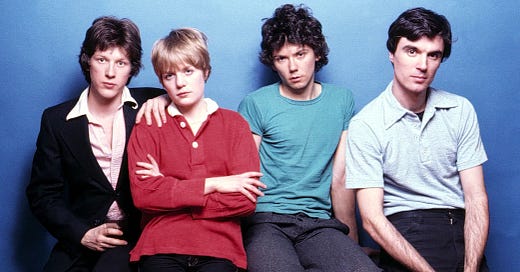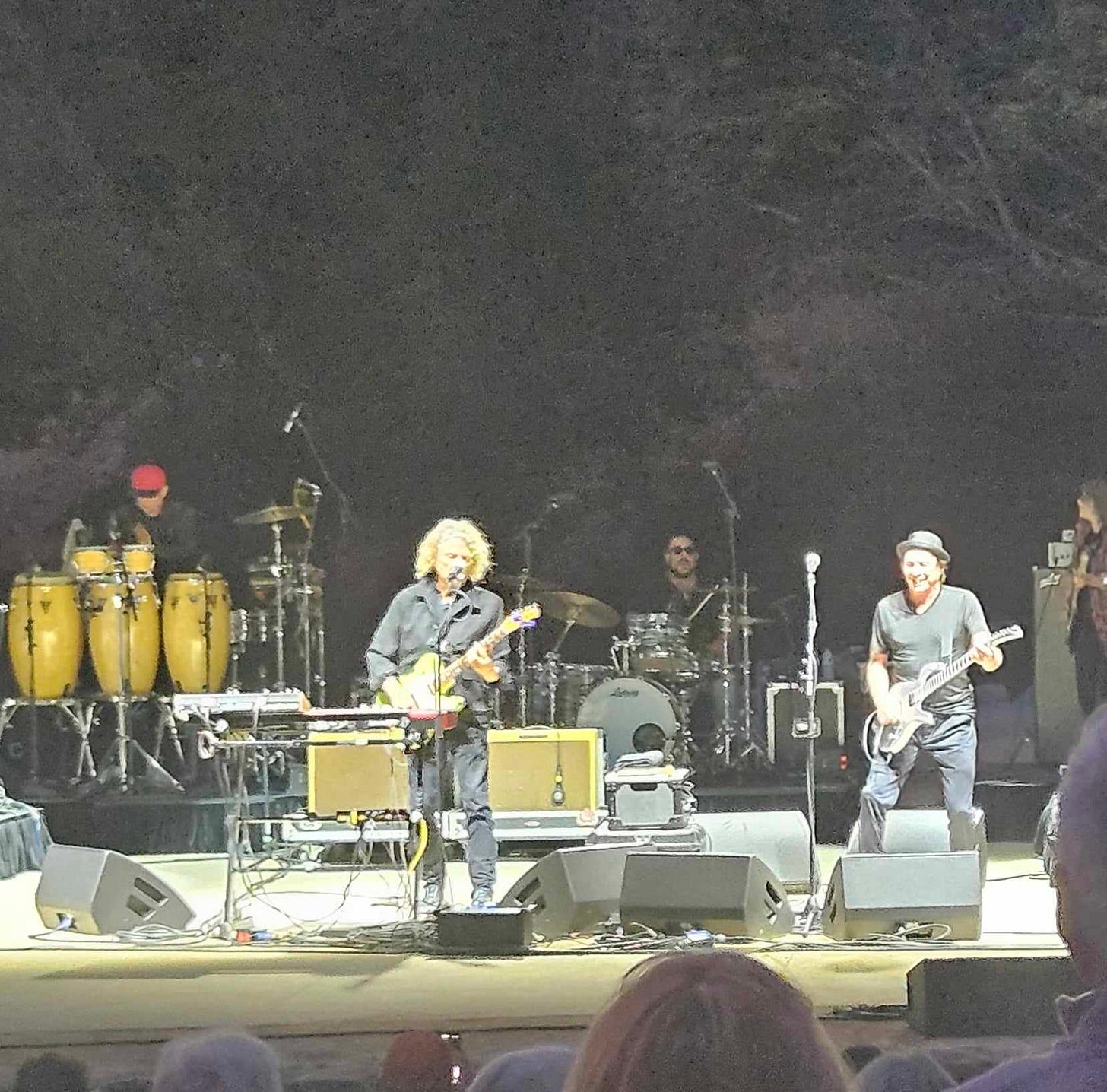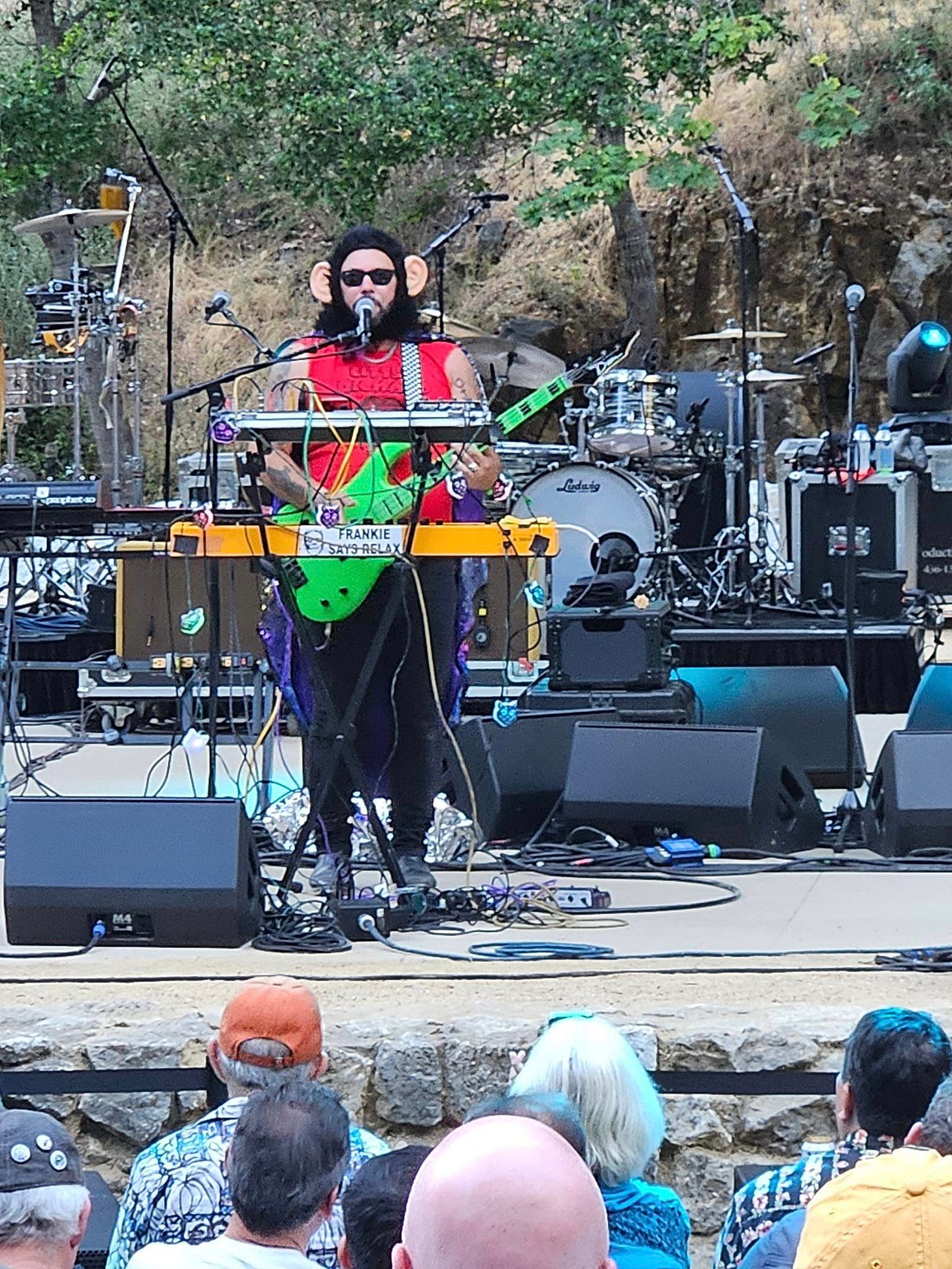Into the blue again
Jerry Harrison and Adrian Belew's "Remain In Light" tour at UCSC Quarry Amphitheater, August 16, 2024
Back when I was in high school, my Dad worked at UC Berkeley, and one day I drove to work with him in the morning because I heard on the radio station KSAN that a New York band called Talking Heads were playing a free concert there at noon.
In those days music like theirs was practically a secret, you only heard about it via word of mouth, and usually the mouth belonged to Richard Gossett. I think that "Psycho Killer" was on high rotation on that station at the time, but they were still more like a rumor than a reality, part of this weird arty thing burgeoning on a few grimy blocks in Manhattan. It was so, so, so very far from my suburban reality and sounded all the more romantic because of it. So I went to Berkeley and sat in my Dad's office in Wurster Hall doing my homework until lunchtime when the show began.
Bands probably still play for free on Sproul Plaza all the time, but there was a difference with this gig, and it was that the Talking Heads performance was transformational. You heard it and you couldn't go back. It wasn't only that they looked and sounded so cool and new, it was that other music started to sound dumb and wrong after you'd experienced it. In a way, I wish I hadn't gone, because my life might have been different. Maybe I'd have gone through life just listening to regular radio and liking the high rotation songs on it. But I don't know, maybe not. Styx was big back then. So was Supertramp.
Anyway, I thought about that afternoon at UC Berkeley during Jerry Harrison's "Remain In Light" tour at UCSC's Quarry Theater last weekend. As we waited for the band, the sound system blasted out a series of songs from the late 70s and early 80s, but it was all mixed-up. It played Hall and Oates, the Clash, Led Zeppelin, Steeler's Wheel and many other big hit songs of several eras, and as the time grew closer to the band appearing, it morphed into a series of soul hits by Bill Withers and people like that. None of that music would ever been heard by me at the same time, on the same station, back in the day, but it was all a good reminder of just how different the Talking Heads sounded from absolutely everything else.
In 1977, "Talking Heads 1977," was just about legible to my baby ears, but "Remain In Light" (1980) and "Fear of Music" (1979) were in a musical language that was foreign to me. And can I just say, it’s truly crazy to think those albums were only three years apart? That’s nuts. Around that time I saw the band perform at Zellerbach at UC Berkeley. The live band included Busta Cherry Jones and Bernie Worrel from Parliament Funkadelic, and the opener was the English Beat, and it was indescribable: so far from anything I’d seen before, utterly mesmerizing. It was like some kind of a sacred rite, it drew you into it with your entire body, not your brain, and that was very different from music at that time. People left that show in a trance. We simply didn't have the words. When shows are like that, I sometimes say, it feels like I am still there…and it does, it’s like part of me got left behind in the auditorium and occasionally I can access it.
The Talking Heads haven't played together for a million years, so this show at UCSC, which featured one Talking Head (Jerry Harrison) and one half of a Talking Head (Adrian Belew), as well as 9 piece band, is as close as one's going to get for the moment. The tour is billed as the "Remain In Light" tour and drew heavily from that record - “Born Under Punches,” “Cross-eyed and Painless,” “Life During Wartime,” and “Houses in Motion” were just a few of the highlights — and it sounded more or less like the live show I remember at Zellerbach, but also very different. It made one consider what makes a cover band, and what counts as 'real'. There’s something about bands that make it so that you can’t just pull them apart and then have individual strands kind of take over – the strands aren’t like DNA, or whatever those cells are that reconstitute themselves when they split, but people do it, with more or less success. Apparently, the band Foreigner is currently on tour with no original members, which is of course utter bullshit.
By contrast, this band's connection to the original band didn't stretch the bonds of credibility at all, but it was also a reminder that there is something about bands as entities that is inviolable. I liked this version a lot, but I missed Tina Weymouth (especially) and Chris Franz, and even David Byrne, whose voice I had grown weary of by the time the 80s ended. The singers here - Harrison, Belew, and various members of the band Cool Cool Cool who made up quite a bit of the rest of the lineup - did a credible job but these were still interpretations of the songs rather than The Songs, if you know what I mean.
However - all that aside - what interpretations! It was an amazing show, in many ways, a fact which the audience showed by leaping to its feet at the start and never sitting down. The whole place was just one big dance party, people were going mad with joy, they were collectively levitating in a way I have seldom experienced. It reminded me of something Nick Cave said, when he appeared on the Steven Colbert show last week. In answer to the question what is the power of music, he said, 'Music is a thing that makes things better. It is the last legitimate opportunity we have for a transcendental experience really left to us...it is the glue that binds us all together.
"It is at the soul, and the core of the world."
Those words resonated at this show, but the irony of it is that the subject of most of the band's songs is alienation. Indeed, many might think that the key phrase of their entire repertoire is "How did I get here?" from "Once In A Lifetime.,” and the answer - “into the blue again, into the silent water” - is, in the end, it doesn’t matter. In short, "Once in a Lifetime" is a song about death, and it's not the only one of their works that refers specifically to the mystery of life, and of living; the difficulty of it all...the actual cognitive dissonance that much of what we are called on to do here on this planet incurs in our hearts. That is what Talking Heads sing about, and by doing so in a completely rhythmic and infectious manner, maybe they are able to make us feel a tiny better about the whole awful process.
Honestly, to take a song about suicide like "Take Me to the River" and inject a sense of anomie into it is a breathtaking act of imagination. But it is also a beautiful thing to do, and as human as it gets. The show ended with the audience singing, chanting, and then whispering, drop me in the water, and it was easy to see in retrospect why such a song would sound so strange, and yet have such a profound effect on me, when I heard it on Sproul Plaza as a very young girl. I was used to hearing love songs. And I still am, and so are you, but much as we all like to think about love, that uneasy sense that we have been plopped down on a hostile planet, attempting to fit into a society with rules we barely understand, is surely a feeling we all know much better. No wonder we can all relate.







I'm a longtime fan of your writing and especially loved the part in this essay about how you can experience something ineffable in an auditorium and then sometimes access it later in your mind. So true! I always thought "Take Me to the River" was a song about baptism, not suicide. Hmmmm.
Lovely piece, Gina, but echoing Beth, that's not what "Take Me to the River" is about. I can see how you get there, with the verses about being maltreated by the lover - and it's a bracing interpretation. But I think the chorus is pretty clear that it's about being refreshed and reborn from that experience, using the tradition of baptism in local waters as the metaphor: "Take me to the river/ And wash me down/ Won't you cleanse my soul/ Put my feet on the ground." It's very much in line with Al Green's way of blending the secular and the sacred in soul music.